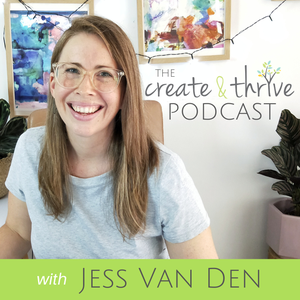
The Create & Thrive Podcast
Jess Van Den
Learn how to turn your handmade hobby into a thriving business with Jess Van Den
- 9 minutes 43 secondsSTOP looking at this number in other people’s Etsy shops.
Today I’m discussing a metric that we all look at and use, but ultimately tells us NOTHING about how successful (or not) a business is.
We often use this number as a proxy for success – but it really tells us very little about how much profit a business is making – which is the more accurate financial metric of success.
Although, it’s not the only metric that matters, and I discuss that today, too.
GIVEAWAY ALERT!
I will be running a HUGE 10th anniversary celebration for the Thriver Circle in late January, and as part of that, I will be giving away 10 prizes over 10 days – and you MUST be in the NEW Create & Thrive Community Facebook group in order to enter and win these prizes!
I’ll be giving away things like FREE months of Thriver Circle membership (open to current and new members), critiques, 1-1 consults with me, courses, & gift cards!
Join the group here: https://www.facebook.com/groups/createandthrivecommunity
✨ BTW – if you’d like to open a new Etsy shop and get 40 free listings, make sure to click on my link here.
You can listen to the podcast below, or on your fave podcast app – or you can watch it on YouTube!
Support the show
- Leave a review on the C&T FB page.
- Leave a review on Apple Podcasts.
- Join the Thriver Circle – without the members of the Circle, this podcast would not be possible.
Watch on YouTube…
Listen Now
 15 January 2025, 11:37 pm
15 January 2025, 11:37 pm - 19 minutes 36 seconds25 handmade business ideas you can start for less than $100!
Thinking of starting a new handmade business, or looking for new products to make?
To kick off 2025, I decided to do a fun episode outlining 25 trending handmade products that you can make in 2025 – for less than $100!
If you want to start your own craft business this year, but you’re not sure what you want to make and sell, then today’s episode might just give you the idea that gets you up and running!
✨ Grab your FREE Ebook: 25 Essential Tips for Running a Handmade Business
GIVEAWAY ALERT!
I will be running a HUGE 10th anniversary celebration for the Thriver Circle in late January, and as part of that, I will be giving away 10 prizes over 10 days – and you MUST be in the NEW Create & Thrive Community Facebook group in order to enter and win these prizes!
I’ll be giving away things like FREE months of Thriver Circle membership (open to current and new members), critiques, 1-1 consults with me, courses, & gift cards!
Join the group here: https://www.facebook.com/groups/createandthrivecommunity
✨ BTW – if you’d like to open a new Etsy shop and get 40 free listings, make sure to click on my link here.
You can listen to the podcast below, or on your fave podcast app – or you can watch it on YouTube!
Support the show
- Leave a review on the C&T FB page.
- Leave a review on Apple Podcasts.
- Join the Thriver Circle – without the members of the Circle, this podcast would not be possible.
Watch on YouTube…
Listen Now
 9 January 2025, 12:41 am
9 January 2025, 12:41 am - 9 minutes 31 secondsEtsy’s put a reserve on my shop – HELP! (Yes, it happened to me, too.)
So Etsy’s put a payment reserve on your account?
Or maybe they haven’t, but you’ve heard horror stories about it, and want to avoid it happening to you?
Yep, it happened to me, too (and I’ve been selling there since 2008)!
I worked out why it happened to me – and how to stop it happening again – and in this video, I outline why it might have happened to you, and – whether it has or hasn’t – how you can avoid it happening in the future.
You can listen to the podcast below, or on your fave podcast app – or you can watch it on YouTube!
Watch on YouTube…
Support the show
You can make a secure donation (of the amount of your choice) via the Paypal button below.

Each donation helps cover the cost of hosting, show-note writing, research, interviewing, recording, editing, etc. etc.
In short – it helps to cover the time and financial costs of putting together a free weekly show to help you grow your handmade business.
You can also:
- Leave a review on the C&T FB page.
- Leave a review on Apple Podcasts.
- Join the Thriver Circle – without the members of the Circle, this podcast would not be possible.
Listen Now
 18 December 2024, 5:00 pm
18 December 2024, 5:00 pm - 11 minutes 57 secondsIs Etsy a good place to start & grow a handmade business in 2025, or a waste of time?
Is Etsy a good place to start a business in 2025 – or is it a waste of time?
This week on the show, I’ll lay out the pros and cons of starting a shop on Etsy in 2025 to help you decide if it’s the right choice for you.
You can listen to the podcast below, or on your fave podcast app – or you can watch it on YouTube!
Watch on YouTube…
Support the show
You can make a secure donation (of the amount of your choice) via the Paypal button below.

Each donation helps cover the cost of hosting, show-note writing, research, interviewing, recording, editing, etc. etc.
In short – it helps to cover the time and financial costs of putting together a free weekly show to help you grow your handmade business.
You can also:
- Leave a review on the C&T FB page.
- Leave a review on Apple Podcasts.
- Join the Thriver Circle – without the members of the Circle, this podcast would not be possible.
Listen Now
 11 December 2024, 5:00 pm
11 December 2024, 5:00 pm - 26 minutes 33 secondsEtsy’s Domestic & Global Pricing is BROKEN.
Etsy’s Domestic & Global pricing is broken.
If you are an Etsy seller outside of the USA, you NEED to know about this ongoing Etsy issue.
I am far from the only person who this has happened to – so today I want to amplify this issue.
Long story short – they have been charging my international customers domestic prices.
And it’s been costing me (and many others!) money.
I detail what is happening, how to deal with it if it’s happened to you, and what we’re doing to avoid this issue in the future in todays episode.
If you know other sellers outside of the USA, please share this with them to alert them to this issue so they can address it if it’s happened to them – and so they can watch out for it happening in the future.
You can listen to the podcast below, or on your fave podcast app – or you can watch it on YouTube!
Watch on YouTube…
Support the show
You can make a secure donation (of the amount of your choice) via the Paypal button below.

Each donation helps cover the cost of hosting, show-note writing, research, interviewing, recording, editing, etc. etc.
In short – it helps to cover the time and financial costs of putting together a free weekly show to help you grow your handmade business.
You can also:
- Leave a review on the C&T FB page.
- Leave a review on Apple Podcasts.
- Join the Thriver Circle – without the members of the Circle, this podcast would not be possible.
Listen Now
 26 November 2024, 4:23 am
26 November 2024, 4:23 am - 53 minutes 41 secondsHow to Get into the BEST Handmade Markets & Shows with Mona of River Timber Designs
Have you ever dreamed of selling your handmade creations at the top craft markets/shows/fairs in your country?
Today, I’m chatting with Mona from River Timber Designs, who has built her business up by doing just that!
After starting on the local artisan market circuit, she has focussed on getting her work into the big (and profitable!) markets around Australia – and today she talks about why it’s a great fit for her business, and how you, too, can get your work into these markets!
See her work here: River Timber Designs
Take my Markets 101 workshop inside the Thriver Circle.
You can listen to the podcast below, or on your fave podcast app – or you can watch it on YouTube!
Watch on YouTube…
Support the show
You can make a secure donation (of the amount of your choice) via the Paypal button below.

Each donation helps cover the cost of hosting, show-note writing, research, interviewing, recording, editing, etc. etc.
In short – it helps to cover the time and financial costs of putting together a free weekly show to help you grow your handmade business.
You can also:
- Leave a review on the C&T FB page.
- Leave a review on Apple Podcasts.
- Join the Thriver Circle – without the members of the Circle, this podcast would not be possible.
Listen Now
Highlights of this Episode…
- Mona makes homewares and jewellery from the burls of trees and uses the live edges and resin to make colourful reflections of nature.
- After working in corporate, Mona developed RSI in both arms, and while on sick leave she decided to start her own business. Mona and her partner had a fallen tree in their backyard which they had milled, and this ignited her interest in creating things from timber.A
- After learning of resin work from a friend and doing some research, Mona’s first pieces were timber and resin pendants as this allowed her to learn what worked and what didn’t, but on a small scale.
- Still having the workplace injury, starting out with jewellery was a more sensible option as a piece could be completed in a relatively short time.
- Mona now makes lamps and is the only artist in Australia making this type of piece. At big markets, these lamps are what catches the eye of shoppers and encourages them to look at Mona’s stall.
- What works best for Mona as a full time maker is attending the large design shows / markets that run for 2-3 days, and she travels all across Australia to attend.
- Markets comprise 80-85% of Mona’s income, with the remainder coming from her website, and a small amount of social media interaction.
- Jess queried the transporting of Mona’s products for the design shows given the weight of some of them. Mona explained that she drives with her products to the various cities, except for Melbourne when she flies and does not take her heavier pieces to show.
‘…When I do shows, I’m very intentional…I’m pricing myself. It’s my time, cost of the product, the materials. And where I find my customers is at these trade shows, at these markets, where people understand it’s handmade. {Mona}
- Jess discussed the making one-of-a-kind products. This doesn’t work for those selling online as it is too time consuming to take product photos, edit them, write listing descriptions, etc. Mona’s products are all one-of-a-kind and therefore she focuses on market selling where her products will be recognised for their quality and uniqueness.
- Mona stated that many makers start out selling at markets, rather than spending time creating listings on a website.
- Mona also enjoys the social aspects of the markets as she is an extrovert and gets energy and confidence from being around people and getting their feedback.
‘Understanding yourself is a really important part of being a successful business owner, understanding what sort of structure of business will suit you and help you maintain that long term.’ {Jess}
- Mona often is asked to attend other types of shows and expos, but knows that these will not make her happy and fit with her business goals, so she has learned to say no.
- Jess agreed with this, stating that it can be fun to try new things when you first start out in business as this can help you determine what works for you, but makers should choose an area to focus on that helps them achieve their goals.
- Advice from Mona for makers wishing to start out in markets:
-
- Take good product photos so that you can present your work clearly and accurately to those taking the bookings for the market
- Develop a good ‘elevator pitch’ so that you can quickly explain what your business is to those who don’t know. What do you make, what makes you different, how is it a sustainable business?
- Start small, and chat to other market stall holders about their experienceBe intentional about which markets you attend so that your products are not priced out.
- Tips for attending markets:
-
- Spend a bit of time making sure your display works, and look at how other stallholders have arranged their products
- Be aware of customer flow, and how your stall will be viewed from a range of angles. Place your ‘hero pieces’ in full view of the customer access to your stall
- Don’t be using your phone while customers are walking past, and acknowledge people with a smile, or say hello.
- Jess and Mona discussed how to manage multiple customers at the stall. It’s important to acknowledge each person who is at the stall, even if you are currently serving another customer. This makes them feel engaged and will encourage them to stay and look at more products. Mona also suggested to never take payment until you have finished wrapping their product – This gives them time to keep looking at your products and potentially purchase an additional item.
- Mona spoke about how she manages difficult customers. Negative customers usually only equate to about 0.1% of customers so if you don’t engage, then you are missing out on the other 99.9% of customers. Also, most criticisms come from a lack of understanding of the process of making the product, so should not be taken personally.
- Mona’s RSI and time management was discussed.
- When you work with an injury, allow yourself to not think you are lazy. Accept that this is your reality and put things into perspective.
- Understand how you work. For example, Mona has to work on several items at the same time as she cannot focus on one project. This also helps with her injury as she is not doing the same process for a long period.
- Advice from Mona: If you want to sell products, try different ways of selling. Try wholesale, Etsy, website, markets, and word of mouth. Tell people what you make and sell, and they will tell other people.
- You can find Mona at upcoming events such as Finders Keepers in Melbourne, and Makers and Shakers in Sydney, and online at rivertimberdesigns.com.au and Instagram.
 13 November 2024, 11:56 pm
13 November 2024, 11:56 pm - 10 minutes 3 seconds8 Steps to Get your Handmade Products into Retail Shops [326]
Thinking about selling your handmade products via wholesale?
In this video and podcast episode, I’ll guide you through 8 steps to follow in order to get your handmade creations stocked in brick & mortar retail shops and boutiques!
If you need more help, and you’re ready to dive into the world of wholesale, don’t miss our Wholesale Know-How course!
AND, if you just want to dip your toe in the water to check if you’re ready to sell via wholesale, download the FREE mini-guide ’10 Steps to Wholesale Readiness’ right here.
You can listen to the podcast below, or on your fave podcast app – or you can watch it on YouTube!
Watch on YouTube…
Support the show
You can make a secure donation (of the amount of your choice) via the Paypal button below.

Each donation helps cover the cost of hosting, show-note writing, research, interviewing, recording, editing, etc. etc.
In short – it helps to cover the time and financial costs of putting together a free weekly show to help you grow your handmade business.
You can also:
- Leave a review on the C&T FB page.
- Leave a review on Apple Podcasts.
- Join the Thriver Circle – without the members of the Circle, this podcast would not be possible.
Listen Now
 10 September 2024, 5:03 am
10 September 2024, 5:03 am - 1 hour 10 minutesWhy you need to “Choose Your Hard” with Laurel Taylor [325]
“Choose Your Hard.”
I love this quote to live by shared by our guest on the show today – Laurel Taylor.
Laurel and I have a wide-ranging discussion in this episode, where she shares her journey from learning to knit as an aid to focus, to starting and growing her business – Alabaster Purl – through many twists and turns – including moving from Alaska to Oregon to Texas!
Laurel specializes in handmade knitwear and selling at in person shows, and she also has published a handful of knitting patterns.
She has a lot of wisdom to share on how to maintain a handmade business long-term, and we have a lot of fun in this episode, too!
I hope you enjoy it.
You can listen to the podcast below, or on your fave podcast app – or you can watch it on YouTube!
Watch on YouTube…
Support the show
You can make a secure donation (of the amount of your choice) via the Paypal button below.

Each donation helps cover the cost of hosting, show-note writing, research, interviewing, recording, editing, etc. etc.
In short – it helps to cover the time and financial costs of putting together a free weekly show to help you grow your handmade business.
You can also:
- Leave a review on the C&T FB page.
- Leave a review on Apple Podcasts.
- Join the Thriver Circle – without the members of the Circle, this podcast would not be possible.
Listen Now

- In 2008, Laurel was struggling to focus in school when a friend offered to teach her to knit, thinking that if her hands were engaged, then her mind would follow. This was successful and helped her to focus in class.
- Laurel continued knitting and moved from Alaska to Oregon in 2010 where she decided to make Christmas gifts for all of her husband’s family and posted photos on social media. This prompted other friends and family to place orders with her for knitted items, and her business, Twiddle’s Treasures, was born.
- After a few years in business, Laurel rebranded from her childhood nickname of Twiddle to Alabaster Purl and opened an Etsy shop.
‘…Things have never really taken off for me on Etsy for my finished items, but they do super well at in person shows. That’s my passion now, selling at markets.’ {Laurel}
- 2019 and her family moved to Texas which was a huge culture shock, and there was some doubt as to whether Laurel’s knits would sell as well in a warmer state. With some extra effort leading up to the winter, Laurel had a successful selling season.
- The effect of Covid-19 on Laurel’s business was discussed, and this was a big challenge with many markets being cancelled. This prompted a larger focus on online sales.
- Sales of patterns, particularly Laurel’s ‘Hope Shawl’ took off on Etsy during this period, where previously these had not sold well. Buyers also knitted the ‘Hope Shawl’ and shared their work which helped sales.
- Social media was discussed. Facebook is the preferred platform in Texas however Laurel prefers Instagram. She is also working on creating her own website and getting an email list going.
- Laurel really enjoys making Reels, videos, voice overs, making people laugh and the creative aspects of this process, but this isn’t always the best way to grow her business.
- Jess suggested that TikTok might also be a good platform for these types of videos, however the process can be very time consuming if using multiple platforms. Makers also need to think about which platform their target audience would be using and focus on that.
- Laurel spoke about some of her challenges and goals. Her major goal was preparing for a specific show this year, but she was not accepted, and now is having to shift her focus.
- Smaller benchmarks have been achieved, like reaching 10k followers on Instagram and now being to almost 30k followers.
- Maintaining her business after moving to Texas was also a proud moment for Laurel, proving able to sell knits in a hot climate.
- Laurel feels very blessed and fortunate to be able to run her business full time, rather than as a side gig.
- Recent changes in the economy and their effect on small businesses was discussed as this has had a big impact on many makers, with people having less disposable income.
- Jess raised that Laurel has incrementally built her business rather than trying to do all the things at once. It’s good for other makers to see that you can take time to grow the business.
- Laurel has begun using SKUs to track her products and see which are more profitable. This allows her to focus on popular colours and phase out those that are less so. Some items are one-of-a-kind if they are hand-dyed, whereas some are made in a batch.
- Laurel’s life outside of the business was spoken about. She enjoys the control over her time that comes from being self-employed, as well as the freedom to live where she wants to, and having a quiet life.
- Jess spoke about having annual planning days to plan out one year at a time: run a course at this time, release a new design at this time, etc. Jess also plans out other activities like corresponding YouTube videos, podcast content etc. However, it’s important to be flexible and be able to pivot when life intervenes.
- Advice from Laurel: If just starting out in business, makers should ask themselves the hard question about what your goals are for the business and keep that goal in mind throughout. Do you want a side hustle, or a business that will make enough money to pay your bills/debts?
‘…Define success for your family, for you, for your business, before you even get started. Because if you jump into it and define success for you as you’re going, you could let yourself down and think that you’re failing when you’re not. You might have defined success incorrectly for yourself.’ {Laurel}
- QTIP or Quit Taking It Personally: This is especially important when selling at markets as you have to deal with the in-person rejection of your products.
- Don’t fight for the customers who don’t value your work.
- ‘Choose your hard’ is Laurel’s quote that she lives by. Some decisions and steps are difficult to take, but they are worth it.
- You can find Alabaster Purl on Instagram, Facebook for finished items, Ravelry and Etsy for knitting patterns, and later in the year on her website: alabasterpurl.com.
27 August 2024, 2:20 am - 8 minutes 13 secondsIs Handmade Business Dead? [324]
This has been a tough year for handmade business owners.
I’ve seen so many people closing up their shops – even people who’ve been in business for well over a decade.
With the economic crisis; the rise of platforms like Shein, Temu, Amazon; the increased cost of postage and materials; and the downfall of Etsy – is it game over for handmade business – especially online?
You can listen to the podcast below, or on your fave podcast app – or you can watch it on YouTube!
Watch on YouTube…
Support the show
You can make a secure donation (of the amount of your choice) via the Paypal button below.

Each donation helps cover the cost of hosting, show-note writing, research, interviewing, recording, editing, etc. etc.
In short – it helps to cover the time and financial costs of putting together a free weekly show to help you grow your handmade business.
You can also:
- Leave a review on the C&T FB page.
- Leave a review on Apple Podcasts.
- Join the Thriver Circle – without the members of the Circle, this podcast would not be possible.
Listen Now
 20 August 2024, 12:07 am
20 August 2024, 12:07 am - 8 minutes 25 secondsShould you open a second Etsy shop? [323]
So you’ve got one Etsy shop… but you want to sell something that doesn’t quite fit there.
You’ve been thinking about opening a second shop, but aren’t sure if it’s a good idea.
In this video/podcast, I’m going to outline the pros and cons of having more than one Etsy shop so you can go into it with your eyes wide open and make the decision that’s right for you!
You can listen to the podcast below, or on your fave podcast app – or you can watch it on YouTube!
Watch on YouTube…
Support the show
You can make a secure donation (of the amount of your choice) via the Paypal button below.

Each donation helps cover the cost of hosting, show-note writing, research, interviewing, recording, editing, etc. etc.
In short – it helps to cover the time and financial costs of putting together a free weekly show to help you grow your handmade business.
You can also:
- Leave a review on the C&T FB page.
- Leave a review on Apple Podcasts.
- Join the Thriver Circle – without the members of the Circle, this podcast would not be possible.
Listen Now
 13 August 2024, 12:07 am
13 August 2024, 12:07 am - 15 minutes 57 seconds10 things you MUST do to have a successful online handmade business. [322]
7 August 2024, 1:08 am - More Episodes? Get the App
Your feedback is valuable to us. Should you encounter any bugs, glitches, lack of functionality or other problems, please email us on [email protected] or join Moon.FM Telegram Group where you can talk directly to the dev team who are happy to answer any queries.
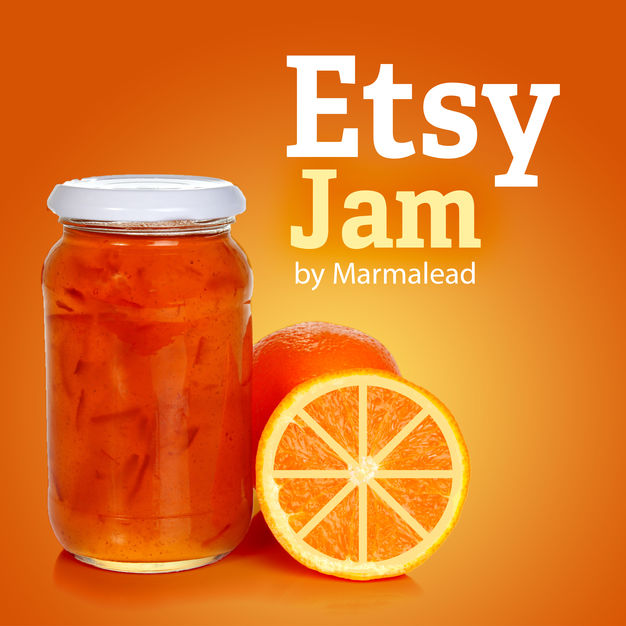 Etsy Jam
Etsy Jam
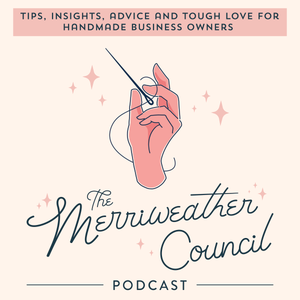 The Merriweather Council Podcast
The Merriweather Council Podcast
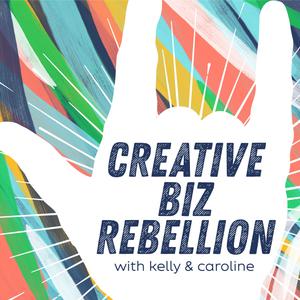 Creative Biz Rebellion
Creative Biz Rebellion
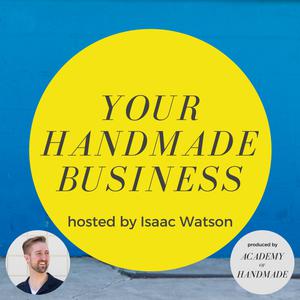 Your Handmade Business
Your Handmade Business
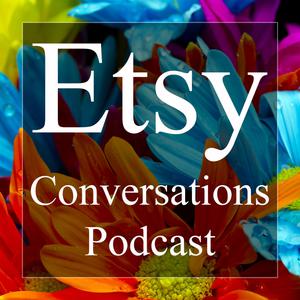 Etsy Conversations
Etsy Conversations
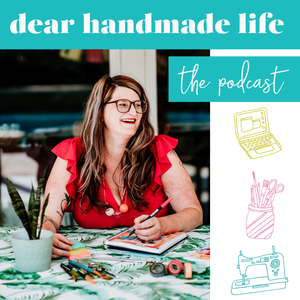 Dear Handmade Life
Dear Handmade Life